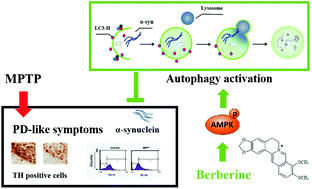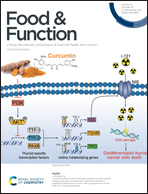Protective effects of berberine against MPTP-induced dopaminergic neuron injury through promoting autophagy in mice
Abstract
Berberine, an isoquinoline alkaloid isolated from Coptis chinensis, has been widely studied for its efficacy in the treatment of neurodegenerative diseases. However, the detailed mechanisms are unknown. In this study, the effects of berberine on 1-methyl-4-phenyl-1,2,3,6-tetrahydropyridine (MPTP)-induced mice model of Parkinson's disease were investigated. We showed that treatment with berberine significantly ameliorates the degeneration of dopaminergic neurons in substantia nigra compacta (SNc) and improves motor impairment in MPTP-treated mice. Berberine also significantly decreased the level of α-synuclein and enhanced the microtubule-associated protein light chain 3 (LC3-II)-associated autophagy in the SN of MPTP-treated mice. Furthermore, adenosine 5′-monophosphate (AMP)-activated protein kinase (AMPK) was activated by berberine. Berberine's actions were abolished by pre-treatment with 3-methyladenine (an autophagy inhibitor) or compound c (an AMPK inhibitor) in the MPP+-treated SH-SY5Y cells. These results suggested that the protective effects of berberine on the toxicity of MPTP could be attributed to berberine-enhanced autophagy via the AMPK dependent pathway.



 Please wait while we load your content...
Please wait while we load your content...